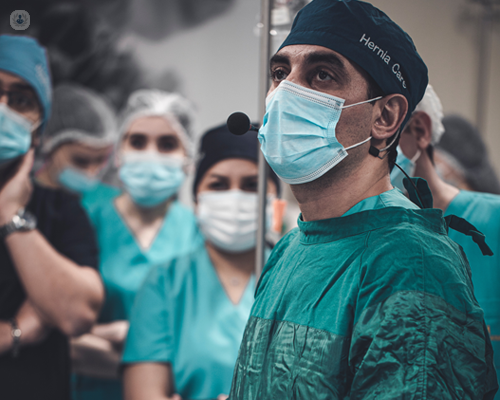Inguinal hernia surgery: An effective solution to the pain
Written by:Inguinal hernias can manifest in ways varying from painless, to uncomfortable and even requiring emergency treatment. Even when they don’t require urgent attention, they can cause significant discomfort that makes everyday life difficult – just watch Joey from Friends try to audition for an acting job with a hernia.
Here to take a detailed look at this condition, and what’s involved in surgery, is highly-esteemed consultant colorectal and general surgeon Mr Andrew Aldridge.

What is inguinal hernia?
A hernia is the protrusion of an internal organ or body part through the wall of muscle or tissue that normally contains it. Most commonly the weakness is within the abdominal wall. Inguinal hernias arise in the groin and account for around 80 per cent of all hernias. They may have been present since birth, but may also be the result of persistent exertion, obesity, frequent coughing, or straining on the toilet due to constipation. Inguinal hernia is most frequently seen in men, but also the most common hernia experienced by women.
They may manifest as a bulge in the groin, which often disappears when lying down, and sometimes have no other symptoms. However, they can also give rise to significant discomfort often described as a dragging or burning sensation. This can impact on quality of life and create difficulty for those with physical jobs. If neglected, they can enlarge substantially, causing a large swelling in the scrotum in men. Rarely, important structures, including the bowel, can be trapped within the hernia and require emergency surgery.
Which surgery is best for inguinal hernia?
Inguinal hernia may be repaired by conventional open surgery or laparoscopic (keyhole) surgery. Each technique routinely makes use of synthetic mesh to reinforce the point of weakness. There has been adverse publicity about mesh, due to complications when used in other areas, particularly gynaecological surgery.
However, it has a proven track record in abdominal hernia repair, having been shown to be very safe, and remains the gold standard. The choice between open and keyhole approaches is a little more debatable. Open surgery appears to have a lower risk of recurrence. However, the most important factor may be the surgeon and their experience of a particular technique.
Is inguinal hernia surgery considered to be a major operation?
Inguinal hernia repair, when performed electively, is usually a relatively minor procedure. It is undertaken as a day case procedure for the vast majority of patients. Longer stays in hospital are usually due to other co-existent medical conditions. Most patients have a brief general anaesthetic, but the procedure may be performed under local anaesthetic or spinal anaesthetic (which temporarily numbs the lower body).
How long does it take to recover from an inguinal hernia repair?
After inguinal hernia surgery, it’s normal to experience mild discomfort for a few days. This may require painkillers for a short while, but rarely for more than a week. Gentle exercise, such as walking, is an important part of recovery and strongly encouraged.
You may not be able to drive for up to two weeks, but can typically return to work after two weeks if employment does not involve manual labour. Return to normal lifting and strenuous activities is usually possible after four weeks.
What is the success rate of inguinal hernia repair?
The success rate of inguinal hernia repair can be quite variable. It is therefore particularly important that the procedure is undertaken by a surgeon with a large experience of the procedure, in which case, the likelihood of recurrence should be less than 1 per cent. This also applies to the risk of troublesome complications, including persistent pain.
If you require surgical treatment for inguinal hernia in Eastbourne, arrange an expert consultation with Mr Andrew Aldridge via his Top Doctors profile.


